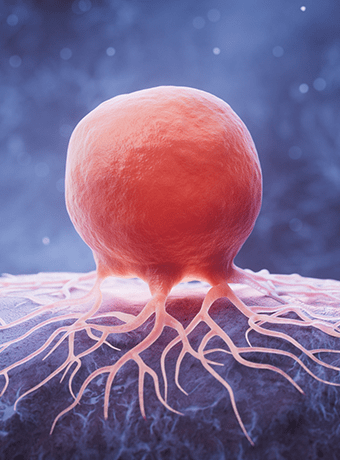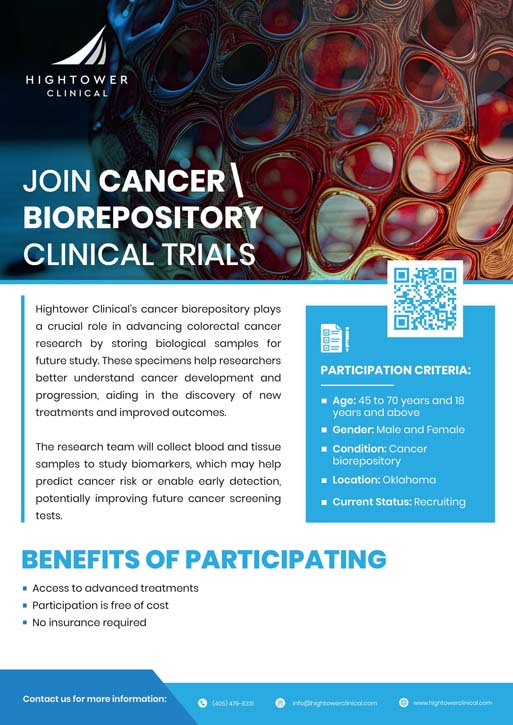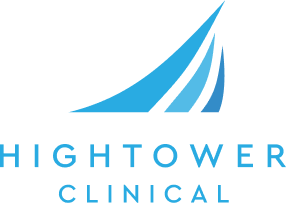The purpose of this clinical trial is to collect and store biological samples to identify biomarkers that may help improve cancer detection, risk assessment, and treatment options. The findings from this research can enhance understanding of cancer and contribute to developing personalized therapies.
Cancer Biorepository
Unlock the future of cancer treatment through thorough research on risks for colorectal cancer and advancing colorectal cancer outcomes for those with this condition.
Enroll Now
Cancer Biorepository—A Brief Overview
This study aims to explore how different types of videos about colorectal cancer (CRC) screening can affect people’s screening rates and how well they follow screening guidelines over time. Participants between the ages of 45 and 70, who are due for a colonoscopy or other CRC screening, will be randomly placed in one of three groups.
In addition to this, the research team will collect blood and tissue samples to study biomarkers. These biomarkers are special features in the body that might help predict cancer risk or detect cancer early in the future. This information could help develop better screening tests for detecting cancer.
Become a part of advancing cancer treatment by participating in our clinical trial.
*Participation is entirely voluntary and comes at no cost to you.
*Simply fill out the form, and our research team will contact you to assess your eligibility for the study.
Cancer Bio Repository
| Study Name | Protocol Number | Sponsor |
|---|---|---|
| Cancer Bio Repository | Exact Sciences | |
2021-05 | Exact Sciences | |
| Harbinger Health |
Cancer Biorepository—Unlocking New Frontiers at Hightower Clinical
A cancer biorepository is vital for cancer research because it stores biological samples for future study. These samples help researchers better understand how cancer develops and progresses.
At Hightower Clinical, our cancer biorepository is dedicated to supporting groundbreaking research aimed at discovering new treatments and improved colorectal cancer outcomes. By collecting and preserving specimens, we provide the resources needed to study the risk for colorectal cancer while exploring diagnostic & therapeutic options. Our skilled team ensures that each sample is handled with the utmost care.
* All procedures and treatments related to the study are provided at no cost, and participation does not require insurance.
* The study physician will clarify all aspects of the clinical trial and address any questions you may have before participation.
What to Expect?
When you agree to join the study, you will first sign an Informed Consent Form that outlines all the details about the trial. Our research team will guide you through the study process and your specific role, ensuring you have the opportunity to ask any questions before making a decision to participate or withdraw.
After you sign the consent form for biorepository-related clinical trials, we will collect your samples on each visit.
*All study-related care is provided at no cost, with skilled physicians performing comprehensive physical exams and assessments.


Age
45 to 70 Y and 18 Y and above
Gender
Male/Female
Condition
Cancer biorepository
Current Status
Recruiting
Cancer Biorepository — Explained
A cancer biorepository collects and stores biological samples to enhance research and improve understanding of cancer, helping to advance treatment possibilities.
Common Signs
- Unexplained Weight Loss
- Skin Changes
- Changes in Bowel or Bladder Habits
- Persistent Fatigue
- Pain
Common Complications
- Metastasis
- Emotional Distress
- Organ Dysfunction
- Infection
- Treatment Side Effects
Frequently Asked Questions
What happens during cancer biorepository clinical trials?
During cancer biorepository clinical trials, we collect biological samples that may include blood samples, plasma samples etc. Participants may also complete surveys or questionnaires regarding their health and medical history.
Why participate in cancer biorepository clinical trials?
Participating in cancer biorepository clinical trials provides patients with the opportunity to contribute to important cancer research that could lead to better detection and treatment options. Additionally, participation is free of charge, and all study-related procedures are covered.




